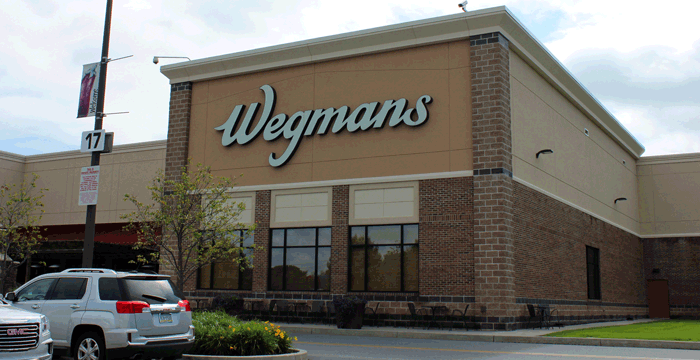
9 Ways to Go Zero Waste at Home: Lessons from Wegmans
We’re partnering with fan-favorite grocery store Wegmans to find out about another soon-to-be favorite sustainability initiative: zero waste. In our third post, find out how you can bring lessons from Wegmans zero waste journey home with you.
Ironically, much of Wegmans zero waste efforts are done back of house, where customers can’t see the great work they’re doing. As Wadsworth said, “At the end of their experience with us, (customers) are left with a package.”
Although there are recycling bins in the store, the challenge remains for customer composting. Customer-facing composting risks a lot of contamination that would negatively affect other back-of-store efforts. In Allentown, Bill Mcelwee, Perishable Manager at the Allentown Wegmans wants to focus on customer efforts as a future phase of zero waste through signage and customer education.
We have good news for you, readers! There’s a lot you can do to get started on your own zero waste journey and impact at home.
What can you do to go zero waste at home?
-
Take a Zero Waste Audit.
You have to know what’s in your trash to reduce it, right? For Wegmans Allentown, they initially did a waste audit where they surveyed what was going into the garbage. From there, the team was able to create tactics to reduce the amount of waste.
Either look in your trashcan or monitor what you put outside each week. If you know what’s in your trash, you’ll see what you need to find a better alternative for or reduce.
2. BYOB (Bring Your Own Bags).
Bring your own bags to the store. Have them accessible by storing them in places like your office, at home by the door, economical in the car.
3. Never put plastic bags in your recycling bins!
Plastic bags often end up stuck in the recycling centers, can contaminate the single-recycling stream and halt the process.
4. Recycle excess Plastic Bags
Reuse plastic bags where you can (dog owners are usually willing to take a few!), but you can recycle the excess plastic bags through stores like Wegmans. And beyond the typical plastic bags, you can also recycle bread bags, produce bags, plastic outer wraps and cereal box liners in the same bins.
Fun fact: the “new” plastic bags at Wegmans are composed of 40% recycled materials.
5. Support local.
As Ned Foley of Two Particular Acres said, “Support a local producer of food, local recycling center for organic food and maybe even a local center for generating energy.”
6. Reduce Food Waste
“I should be the last line of defense before the landfill.”
– Ned Foley, Two Particular Acres
Before sending food to a landfill, you have a few options. We asked Foley for advice on how to reduce food waste.
- Don’t waste food just because it looks bad. If you use a CSA, you’ll see what homegrown food actually looks like – and it’s not typically what you see in the stores.
- Don’t overbuy. Plan recipes for the week, go shopping and buy what you need.
- Try composting at home or with a local service.
For those seeking to convince higher-ups to become more sustainable…
On occasion, we receive reader questions that have companies that still aren’t recycling. If you need to make the sustainability case at work, here are a few bonus tips.
7. Start with the financials.
According to Mcelwee, “It’s more economical to not send things to a landfill from a business standpoint. But the other side is that it eliminates waste, and it better for the environment.”
8. Make the customer case.
Millennials are socially savvy customers that want businesses to reflect their values.
As Mcelwee said, “that’s what customers are into now, especially with younger generations. If you’re a responsible business, you should have those things in check.”
9. It’s easier than we think.
Zero waste and sustainability doesn’t have to be hard with education and proper planning. As Mcelwee said best, “I didn’t realize how easy this would be to get going.”
We always emphasize the simplicity of sustainability and are glad we could share Wegmans Zero Waste journey. For more information, check Sustainability at Wegmans.








